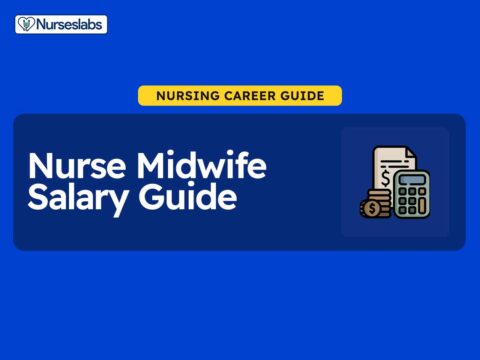Curious about the latest nurse salary trends and how much nurses make in the U.S.? As of 2025, nursing remains one of the most in-demand and well-compensated careers in healthcare. Competitive pay is a big draw to the field, but nurse salaries vary widely depending on role, location, and other factors.
In this updated salary guide for 2025, we break down average registered nurse (RN) salaries, pay by nurse specialization, RN salary by state, the highest and lowest paying states, and how factors like education, specialty, location, and union status can impact earnings. We’ve compiled the most up-to-date data from the U.S. Bureau of Labor Statistics (BLS) to help you understand how much nurses are earning in 2025 and why it matters.
What is the Average Nurse Salary?
How much do registered nurses (RNs) make? According to the latest U.S. Bureau of Labor Statistics (BLS) data for 2024-2025, RNs earn an average (mean) salary of about $98,430 per year, which equates to roughly $47.32 per hour. These salary figures are based on 2024 data from the U.S. Bureau of Labor Statistics (BLS), officially released in 2025.
| Year | Employment | Hourly Nurse Salary | Annual Nurse Salary |
|---|---|---|---|
| 2024 | 3,282,010 | $47.32 | $98,430 |
| 2023 | 3,175,390 | $45.42 | $94,480 |
| 2022 | 3,072,700 | $42.80 | $89,010 |
| 2021 | 3,047,530 | $39.78 | $82,750 |
The median annual salary for registered nurses is $93,600 (about $45 per hour). This is nearly double than the national average for all U.S. occupations (around $49,500), reflecting the strong demand and value of nurses’ skills.
In comparison, licensed practical/vocational nurses and nursing assistants (who have lower training requirements) earn significantly less on average, while advanced practice registered nurses (APRNs) earn substantially more (as we’ll see below). Nurse salaries have been on a steady upward trend, and 2025 is no exception, with RNs earning more now than ever before.
The total number of employed RNs nationwide is enormous – about 3.28 million RNs were working across the country as of 2024-2025, making nursing one of the largest occupations in the U.S. healthcare sector.
Understanding the average nurse salary matters especially for aspiring and current nurses, as this can help set realistic expectations and goals. It also highlights nursing as a rewarding career financially – important given the responsibilities and critical care that nurses provide. However, remember that this national average is just a starting point. Actual salaries differ based on your role (e.g. RN vs. nurse practitioner), geographic location, and other factors (which are discussed below). Next, we’ll break down nurse salaries by state.
Nurse Salary by State
Where you work can have a major impact on your paycheck. Registered nurse salaries vary drastically by state, often influenced by cost of living, demand for nurses, and local labor markets. Generally, states on the West Coast and in the Northeast offer higher RN salaries, while many Southern and Midwestern states pay below the national average. The table below shows the average annual RN salary and hourly wage in each state (using BLS 2024-2025 data), illustrating how location impacts pay.
| State | 2024 RN Salary (latest data) | 2023 RN Salary | 2022 RN Salary |
|---|---|---|---|
| Alabama | $74,970 | $71,370 | $61,920 |
| Alaska | $112,040 | $109,210 | $97,230 |
| Arizona | $95,230 | $91,430 | $81,600 |
| Arkansas | $77,720 | $72,900 | $65,810 |
| California | $148,330 | $137,690 | $124,000 |
| Colorado | $91,730* | $91,730 | $80,670 |
| Connecticut | $103,670 | $101,840 | $88,530 |
| Delaware | $95,450 | $94,670 | $77,760 |
| District of Columbia | $109,240 | $106,850 | $98,540 |
| Florida | $88,200 | $84,760 | $72,000 |
| Georgia | $91,960 | $90,000 | $75,380 |
| Hawaii | $123,720 | $119,710 | $106,530 |
| Idaho | $89,770 | $83,090 | $73,640 |
| Illinois | $91,130 | $87,650 | $78,260 |
| Indiana | $85,850 | $82,700 | $68,890 |
| Iowa | $77,780 | $74,610 | $64,990 |
| Kansas | $79,430 | $76,240 | $66,560 |
| Kentucky | $83,900 | $81,770 | $67,260 |
| Louisiana | $84,110 | $80,760 | $70,380 |
| Maine | $87,440 | $84,340 | $73,630 |
| Maryland | $96,650 | $92,090 | $82,660 |
| Massachusetts | $112,610 | $108,850 | $96,630 |
| Michigan | $90,580 | $86,210 | $75,930 |
| Minnesota | $99,460 | $94,830 | $84,030 |
| Mississippi | $79,470 | $75,510 | $63,130 |
| Missouri | $81,950 | $77,590 | $67,790 |
| Montana | $88,480 | $82,950 | $73,610 |
| Nebraska | $82,890 | $79,780 | $69,850 |
| Nevada | $102,280 | $97,700 | $88,800 |
| New Hampshire | $94,620 | $89,410 | $78,270 |
| New Jersey | $106,990 | $101,960 | $89,690 |
| New Mexico | $94,360 | $92,140 | $77,590 |
| New York | $110,490 | $106,620 | $93,320 |
| North Carolina | $86,270 | $82,530 | $71,200 |
| North Dakota | $81,900 | $79,190 | $71,200 |
| Ohio | $86,110 | $84,430 | $71,640 |
| Oklahoma | $85,800 | $82,110 | $68,180 |
| Oregon | $120,470 | $113,440 | $98,630 |
| Pennsylvania | $90,830 | $87,530 | $76,000 |
| Puerto Rico | $41,470 | $39,130 | $39,130 |
| Rhode Island | $99,770 | $95,070 | $85,270 |
| South Carolina | $84,930 | $81,390 | $69,580 |
| South Dakota | $72,210 | $69,030 | $60,540 |
| Tennessee | $82,010 | $78,240 | $66,680 |
| Texas | $91,690 | $90,210 | $79,120 |
| Utah | $88,240 | $83,100 | $72,790 |
| Vermont | $92,710 | $88,380 | $75,160 |
| Virginia | $90,930 | $88,350 | $76,680 |
| Washington | $115,740 | $111,030 | $95,350 |
| West Virginia | $80,650 | $75,990 | $67,640 |
| Wisconsin | $90,450 | $87,220 | $76,850 |
| Wyoming | $88,020 | $83,990 | $73,130 |
According to the latest BLS data, the highest-paying states for RNs in 2025 are:
- California – around $148,000 average annual RN salary
- Hawaii – around $124,000 per year
- Oregon – around $120,000 per year
- Washington – around $116,000 per year
- Massachusetts – around $113,000 per year
It’s no surprise that California leads the nation – RN salaries there average about $148K, thanks to strong unions and high living costs, among other factors. Hawaii, Oregon, Washington, and Massachusetts round out the top five, each with average RN pay well above $110K annually. Other high-paying areas include Alaska ( $112K), New York ($110K), and the District of Columbia (~$109K).
On the other end of the spectrum, the lowest-paying states for RNs tend to be in the South and Midwest. The state with the lowest average RN salary is South Dakota, where RNs earn about $72,000 per year on average. Other states at the bottom include:
- Arkansas – around $78,000 per year
- Iowa – around $78,000 per year
- Kansas – around $79,000 per year
- Mississippi – around $79,000 per year
In Mississippi, Alabama, Kansas, Iowa, and Arkansas, RN salaries typically fall in the high-$70Ks to low-$80Ks range, well below the national average. South Dakota is a notable outlier, with an average just above $72K.
Keep in mind that these differences often correlate with the local cost of living – lower-paying states usually have cheaper housing and goods. For example, while California nurses top the pay scale, California’s cost-of-living is about 12.5% higher than the national average, which offsets some of that salary advantage. Still, geographic pay gaps are significant: an RN in California can make nearly double what an RN in South Dakota earns.If you’re open to relocation, moving to a higher-paying state (and obtaining a multistate nursing license if applicable) can substantially boost your income. Just be sure to weigh salary against living costs for a true picture of purchasing power in each state. Next, we’ll look at how the nursing role and specialization you choose can also affect your salary.
Nurse Salary by Role and Specialization
Nurses work in a variety of roles, from entry-level licensed vocational nurses to highly specialized nurse anesthetists. Each role comes with different education requirements and responsibilities – and consequently, different salary ranges. Below is a breakdown of average salaries for key nursing roles using the latest BLS data:
| Role | Latest Average Nurse Salary 2024‑2025 | Average Nurse Salary (2023-2024) | Δ vs. 2023 |
|---|---|---|---|
| Certified Registered Nurse Anesthetist (CRNA) | $231,700 | $214,200 | ▲ 8.2 % |
| Nurse Practitioner (all specialties) | $132,000 | $128,490 | ▲ 2.7 % |
| Certified Nurse Midwife (CNM) | $128,110 | $131,570 | ▼ 2.6 % |
| Registered Nurse (staff‑level) | $98,430 | $94,480 | ▲ 4.2 % |
| Nursing Instructors & Teachers | $87,090 | $86,530 | ▲ 0.7 % |
| Licensed Practical / Vocational Nurse (LPN/LVN) | $64,150 | $60,790 | ▲ 5.5 % |
| Nursing Assistant | $41,270 | $39,610 | ▲ 4.2 % |
Licensed Practical/Vocational Nurses (LPNs/LVNs), who typically have about a year of training, earn the lowest salaries among licensed nurses – around $60–64K per year on average. Registered Nurses (RNs), who must have an associate or bachelor’s degree, earn a national average of about $94K–$98K annually. In fact, the BLS reported the median RN wage was $93,600 as of May 2024, while the average RN wage was ~$98,430.
Moving up the ladder, Advanced Practice Registered Nurses (APRNs) — a category that includes nurse practitioners, nurse midwives, and nurse anesthetists — earn significantly higher salaries. These roles require a master’s or doctoral degree and expanded clinical responsibilities (often including diagnosing and prescribing). For example, Nurse Practitioners (NPs) have an average salary around $126K–$132K per year, reflecting their greater autonomy and specialty training. Certified Nurse Midwives (CNMs) earn a similar range (approximately $130K on average). At the top of the pay scale, Certified Registered Nurse Anesthetists (CRNAs) are the highest-paid nurses, earning about $230K as a median/mean salary – more than twice the salary of a typical RN. This huge pay gap underscores the advanced education and high-stakes responsibilities CRNAs carry, as they administer anesthesia and manage patient airways during surgery and procedures.
It’s also worth noting that specialties within registered nursing (aside from APRNs) can influence pay. For example, critical care, oncology, or cardiac ICU nurses often earn more than general medical-surgical floor nurses, sometimes significantly so, especially if they obtain specialty certifications or work as travel nurses. While detailed specialty-by-specialty data isn’t provided by BLS, hospital salary structures often include premiums for specialized skills or high-demand units. Now, let’s examine how roles and specialization vary per state.
Nurse Roles and Specialization Salary per State
Let’s take a comprehensive look at the annual mean nurse salaries for various nursing specializations and related nursing fields across the U.S. Beyond general registered nursing, advanced practice and specialized nursing roles command even higher salaries. In particular, Advanced Practice Registered Nurses (APRNs) – such as Nurse Practitioners, Nurse Anesthetists, and Nurse Midwives – are among the best-paid nurses.
| State | Registered Nurse Annual Salary | Nurse Anesthetist Annual Salary | Nurse Midwife Annual Salary | Nurse Practitioner Annual Salary | Nurse Instructor Annual Salary | LPN/LVN Annual Salary | Nursing Assistant Annual Salary |
|---|---|---|---|---|---|---|---|
| Alabama | $71,040 | $179,160 | – | $106,930 | $77,270 | $50,100 | $32,470 |
| Alaska | $110,690 | – | $130,030 | $145,450 | $92,050 | $77,670 | $45,840 |
| Arizona | $96,890 | $228,690 | $135,590 | $133,790 | $68,360 | $74,020 | $41,980 |
| Arkansas | $77,130 | $134,230 | – | $113,660 | $64,330 | $51,030 | $31,990 |
| California | $140,330 | – | $196,700 | $166,610 | $99,010 | $77,170 | $46,420 |
| Connecticut | $101,590 | $227,930 | $124,530 | $138,960 | $81,490 | $69,130 | $44,500 |
| Delaware | $92,610 | $236,800 | $99,060 | $127,810 | $83,420 | $66,090 | $39,240 |
| District of Columbia | $104,550 | – | $106,580 | $131,380 | $103,780 | $70,420 | $46,860 |
| Florida | $82,850 | $197,940 | $115,440 | $129,010 | $83,940 | $60,080 | $36,850 |
| Georgia | $86,560 | $221,190 | $125,830 | $126,060 | $75,950 | $58,490 | $36,570 |
| Guam | – | – | – | $105,060 | – | $36,150 | $32,970 |
| Hawaii | $136,320 | – | – | $130,940 | $102,180 | $65,560 | $44,830 |
| Idaho | $86,100 | – | $89,870 | $128,940 | $75,420 | $61,720 | $37,530 |
| Illinois | $86,410 | – | $114,420 | $128,620 | $78,870 | $66,030 | $44,750 |
| Indiana | $80,740 | $233,200 | $129,010 | $128,280 | $77,270 | $63,690 | $37,330 |
| Iowa | $76,960 | $229,950 | $136,450 | $129,420 | $71,910 | $59,460 | $38,630 |
| Kansas | $78,060 | $182,770 | – | $124,690 | $70,960 | $59,920 | $36,910 |
| Kentucky | $79,910 | $212,430 | – | $113,870 | $74,850 | $58,450 | $37,330 |
| Louisiana | $78,880 | $225,440 | $95,420 | $125,980 | $72,990 | $53,930 | $30,240 |
| Maine | $82,860 | $229,900 | $132,920 | $125,040 | $78,770 | $70,870 | $45,640 |
| Maryland | $96,830 | $167,740 | $129,910 | $125,530 | $80,990 | $69,870 | $40,000 |
| Massachusetts | $101,970 | – | $155,710 | $138,890 | $80,140 | $76,560 | $45,410 |
| Michigan | $85,670 | $234,520 | $116,810 | $125,620 | $80,740 | $63,810 | $38,900 |
| Minnesota | $100,870 | – | $127,180 | $128,570 | $78,110 | $60,870 | $45,580 |
| Mississippi | $74,470 | $197,490 | – | $119,290 | $73,160 | $48,850 | $30,460 |
| Missouri | $79,770 | $221,550 | $134,970 | $126,370 | $74,000 | $59,030 | $37,170 |
| Montana | $81,560 | – | – | $133,640 | $84,550 | $59,750 | $39,300 |
| Nebraska | $81,020 | $231,020 | $133,890 | $127,930 | $79,120 | $60,740 | $38,620 |
| Nevada | $101,990 | – | – | – | $84,660 | $73,820 | $45,060 |
| New Hampshire | $96,830 | – | $135,860 | $132,440 | $81,260 | $74,660 | $46,050 |
| New Jersey | $102,730 | – | $135,680 | $149,620 | $102,090 | $71,180 | $44,910 |
| New Mexico | $88,260 | $214,810 | $118,650 | $138,440 | $77,850 | $60,760 | $37,030 |
| New York | $105,600 | – | $137,860 | $145,390 | $93,640 | $64,030 | $47,390 |
| North Carolina | $81,860 | $226,460 | $121,490 | $125,020 | $78,740 | $61,380 | $37,670 |
| North Dakota | $78,260 | $232,420 | – | $123,220 | $83,130 | $60,820 | $44,190 |
| Ohio | $81,250 | $216,350 | $121,720 | $126,740 | $74,570 | $60,990 | $38,570 |
| Oklahoma | $81,160 | $151,470 | – | $126,670 | $65,100 | $55,870 | $35,040 |
| Oregon | $123,990 | – | $123,080 | $144,600 | $101,640 | $76,570 | $48,390 |
| Pennsylvania | $87,610 | $217,670 | $107,740 | $127,400 | $79,920 | $62,010 | $41,110 |
| Puerto Rico | $37,780 | $61,170 | – | – | $73,500 | $24,920 | $20,470 |
| Rhode Island | $99,960 | $131,390 | $127,480 | $130,710 | $74,720 | $77,940 | $44,160 |
| South Carolina | $79,900 | $225,800 | $118,100 | $116,240 | $79,900 | $59,050 | $36,370 |
| South Dakota | $69,510 | $223,650 | – | $122,600 | $63,940 | $49,170 | $38,070 |
| Tennessee | $79,030 | $203,400 | $97,380 | $108,420 | $76,620 | $54,530 | $36,750 |
| Texas | $90,010 | $227,580 | $111,190 | $129,880 | $97,610 | $60,150 | $36,390 |
| Utah | $82,270 | $122,040 | $138,020 | $125,700 | $75,380 | $61,710 | $38,500 |
| Vermont | $85,150 | – | $140,240 | $129,740 | $78,800 | $64,560 | $43,610 |
| Virgin Islands | $73,890 | – | – | – | – | $56,670 | $41,090 |
| Virginia | $88,820 | $199,960 | $139,770 | $124,210 | $78,850 | $62,310 | $38,790 |
| Washington | $112,180 | – | $145,000 | $140,220 | $78,000 | $79,700 | $48,260 |
| West Virginia | $79,990 | – | – | $121,640 | $75,550 | $49,850 | $36,340 |
| Wisconsin | $86,070 | – | $135,360 | $128,580 | $79,810 | $61,040 | $43,250 |
| Wyoming | $81,790 | $181,470 | – | $127,750 | $75,280 | $61,880 | $38,360 |
Historical Data:
| State | Registered Nurses (RNs) | Certified Registered Nurse Anesthetist (CRNA) Salary | Certified Nurse Midwife (CNM) Salary | Nurse Practitioners (NPs) Salary | Nurse Instructors Salary | LVN/LPNs Salary | Nursing Assistants Salary |
|---|---|---|---|---|---|---|---|
| Alabama | $71,370 | $173,370 | – | $110,020 | $87,360 | $48,320 | $31,280 |
| Alaska | $109,210 | – | $128,800 | $126,170 | $98,870 | $74,260 | $47,080 |
| Arizona | $91,430 | – | $119,190 | $132,560 | $80,710 | $66,720 | $40,950 |
| Arkansas | $72,900 | – | – | $113,410 | $66,920 | $49,360 | $32,050 |
| California | $137,690 | $250,920 | $183,740 | $161,540 | $94,530 | $76,580 | $47,070 |
| Colorado | $91,730 | $215,870 | $126,100 | $121,990 | $83,270 | $64,710 | $43,580 |
| Connecticut | $101,840 | $247,740 | $122,530 | $136,980 | $97,050 | $68,150 | $43,050 |
| Delaware | $94,670 | $207,030 | $121,690 | $131,110 | $97,050 | $63,490 | $38,620 |
| District of Columbia | $106,850 | – | $109,970 | $134,850 | $111,130 | $68,120 | $47,860 |
| Florida | $84,760 | $176,950 | $99,310 | $119,710 | $84,740 | $57,140 | $36,750 |
| Georgia | $90,000 | $204,070 | $124,020 | $121,150 | $75,490 | $55,090 | $34,890 |
| Hawaii | $119,710 | – | $161,820 | $132,610 | $97,990 | $62,020 | $44,990 |
| Idaho | $83,090 | $178,600 | $78,530 | $124,550 | $79,810 | $54,600 | $37,270 |
| Illinois | $87,650 | $281,240 | $123,820 | $126,900 | $81,720 | $64,630 | $41,300 |
| Indiana | $82,700 | $207,180 | $120,090 | $123,320 | $79,620 | $59,460 | $37,660 |
| Iowa | $74,610 | $227,710 | $124,040 | $130,820 | $71,690 | $55,870 | $38,380 |
| Kansas | $76,240 | $184,650 | – | $119,270 | $72,260 | $55,610 | $36,020 |
| Kentucky | $81,770 | $185,630 | – | $110,370 | $79,370 | $55,100 | $35,980 |
| Louisiana | $80,760 | $218,770 | – | $118,670 | $78,780 | $51,700 | $30,420 |
| Maine | $84,340 | $227,270 | $140,440 | $122,940 | $79,240 | $71,430 | $42,960 |
| Maryland | $92,090 | $187,420 | $128,400 | $127,990 | $88,610 | $66,460 | $40,770 |
| Massachusetts | $108,850 | $272,510 | $154,080 | $144,010 | $87,140 | $73,400 | $44,750 |
| Michigan | $86,210 | $219,050 | $120,370 | $120,680 | $84,440 | $61,910 | $38,930 |
| Minnesota | $94,830 | $221,650 | $121,860 | $135,010 | $84,730 | $58,870 | $42,960 |
| Mississippi | $75,510 | $201,280 | – | $117,490 | $68,620 | $49,050 | $29,660 |
| Missouri | $77,590 | $230,470 | $122,900 | $116,680 | $76,000 | $55,220 | $36,350 |
| Montana | $82,950 | $256,460 | – | $124,640 | $85,120 | $55,450 | $40,800 |
| Nebraska | $79,780 | $212,860 | – | $121,680 | $78,220 | $56,120 | $38,470 |
| Nevada | $97,700 | – | – | $148,670 | $99,320 | $66,580 | $43,420 |
| New Hampshire | $89,410 | $239,630 | $128,650 | $130,740 | $87,260 | $71,770 | $45,090 |
| New Jersey | $101,960 | $252,130 | $133,980 | $145,030 | $101,540 | $66,620 | $42,960 |
| New Mexico | $92,140 | $212,950 | $116,780 | $136,770 | $72,850 | $56,130 | $37,030 |
| New York | $106,620 | $256,160 | $135,120 | $142,830 | $102,980 | $63,020 | $46,020 |
| North Carolina | $82,530 | $222,560 | $118,660 | $121,590 | $76,970 | $57,760 | $35,340 |
| North Dakota | $79,190 | $234,950 | – | $127,760 | $82,580 | $57,530 | $41,020 |
| Ohio | $84,430 | $210,760 | $124,140 | $122,870 | $80,430 | $57,660 | $38,570 |
| Oklahoma | $82,110 | $208,410 | $124,330 | $65,490 | $51,880 | $33,090 | |
| Oregon | $113,440 | $215,260 | $139,490 | $144,950 | $109,110 | $71,180 | $46,970 |
| Pennsylvania | $87,530 | $209,890 | $121,410 | $127,450 | $85,540 | $58,800 | $39,780 |
| Puerto Rico | $39,130 | $60,540 | – | – | $66,320 | $27,430 | $28,020 |
| Rhode Island | $95,070 | – | $125,820 | $133,460 | $82,820 | $75,470 | $43,390 |
| South Carolina | $81,390 | $233,920 | $95,940 | $116,940 | $81,230 | $56,430 | $34,590 |
| South Dakota | $69,030 | $211,090 | – | $120,980 | $67,200 | $49,580 | $36,360 |
| Tennessee | $78,240 | $194,790 | $103,430 | $103,720 | $84,810 | $50,430 | $34,850 |
| Texas | $90,210 | $216,280 | $112,660 | $130,010 | $93,750 | $56,490 | $35,370 |
| Utah | $83,100 | $125,890 | $133,930 | $127,820 | $92,580 | $57,430 | $37,630 |
| Vermont | $88,380 | $254,790 | – | $126,100 | $82,070 | $65,170 | $41,560 |
| Virginia | $88,350 | $232,250 | $118,750 | $120,870 | $79,950 | $57,810 | $37,440 |
| Washington | $111,030 | $246,350 | $130,990 | $145,400 | $85,320 | $75,410 | $46,430 |
| West Virginia | $75,990 | $232,410 | – | $113,450 | $81,800 | $50,090 | $35,340 |
| Wisconsin | $87,220 | $247,160 | $128,550 | $128,330 | $78,810 | $57,190 | $40,600 |
| Wyoming | $83,990 | $228,780 | – | $123,560 | $72,710 | $58,030 | $39,010 |
| Guam | – | – | – | $88,570 | – | $41,720 | $33,100 |
| Virgin Islands | – | – | – | – | – | $50,280 | $40,270 |
Key Insights from 2023-2024 Data:
- Nurse Practitioners (NPs) have the highest averages in Nevada ($148,670) and Oregon ($144,950), signaling robust demand for APRNs in the West.
- Nursing Instructors have top pay in the District of Columbia ($111,130), highlighting premium compensation for nurse educators.
- Nursing Assistants. Wide range—from $29,660 in Mississippi to $47,080 in Alaska—mirroring local cost‑of‑living and funding.
- LVNs/LPNs: Salaries span $27,430 in Puerto Rico to $75,000+ in California and Rhode Island, with high‑demand markets driving the upper end.
- Regional pattern: The Northeast (New York, Massachusetts, New Jersey) posts strong wages across all roles, while Southern states trend lower overall.
- Competitive South: Texas and Georgia still offer attractive pay for CRNAs and NPs, even with lower living costs.
- Puerto Rico: Consistently lower wages; Nursing Assistants average just $28,020.
- Specialized APRN roles: CRNAs and Nurse Midwives remain the best‑paid nursing careers, reflecting the premium on advanced practice skills.
Where do Registered Nurses Earn the Most?
Nurse salaries aren’t just about where you work, but also what type of facility or industry you work in. Registered nurses are employed in diverse settings – hospitals, clinics, home health, schools, government agencies, and more – and wages can differ between these environments. BLS data shows some clear patterns for RNs:
| Work Setting | Salary | Details |
|---|---|---|
| Government Agencies | $114,860 | Highest-paying sector for RNs. Includes federal/state/local jobs like VA hospitals and public health departments. Benefits and funding drive higher wages. |
| Hospitals (Inpatient) | $97,000 | Most RNs work here. Pay is above average, especially in ICUs, ERs, ORs. Offers shift differentials and overtime opportunities. |
| Outpatient / Clinic Settings | $83,780 | Includes doctor’s offices and ambulatory centers. Slightly lower pay, but more regular daytime schedules and fewer weekend shifts. |
| Nursing Care Facilities | $81,820 | Found in nursing homes and residential care. Generally lower wages due to tighter budgets and less intensive care. |
| Education and Schools | $74,000 (est.) | Includes school nurses and nursing educators. Lower pay, but benefits include regular schedules and academic holidays. |
| Employment Services | $110,230 | Includes travel nursing and contract work. High pay, flexible assignments, but jobs are temporary and may require relocation. |
| Pharmaceutical / Research | $108,640 | RNs in pharma manufacturing or research roles. Niche jobs often require extra qualifications but offer premium compensation. |
In summary, government and hospital jobs generally pay nurses the most, whereas long-term care and school settings pay less. Outpatient clinics and physician offices fall somewhere in between. Additionally, travel nursing (contract assignments via staffing companies) can be very lucrative – often well above the average hourly wage – but those earnings are captured in the employment services category. When evaluating a nursing job offer, consider the setting: a hospital in the same city usually offers higher base pay (and more overtime opportunities) than a clinic or nursing home.
Nurse Salary Trends by Percentile
Registered nurse salaries have seen consistent growth across all experience and specialization levels. The data below reveals the increasing financial rewards within the nursing profession, with wages rising across each percentile, from entry-level positions to those with advanced skills and expertise.
| Year | 10th Percentile | 25th Percentile | 50th Percentile | 75th Percentile | 90th Percentile |
|---|---|---|---|---|---|
| 2024 (latest) | $66,030 | $78,610 | $93,600 | $107,960 | $135,320 |
| 2023 | $63,720 | $75,990 | $86,070 | $104,670 | $132,680 |
| 2022 | $61,250 | $66,680 | $81,220 | $101,100 | $129,400 |
| 2021 | $59,450 | $61,790 | $77,600 | $97,580 | $120,250 |
In other words, about 10% of RNs earn less than $66k, while the top 10% earn over $135k annually. This range reflects differences in experience, education, specialty, and location. Notably, even the 10th-percentile wage (~$66k) is above the U.S. average wage for all occupations, and the top RN earners make well into six figures.
Salary Growth of Nurses
Do average nurse salaries increase over time? Nurse salaries have been rising steadily over the past decade, outpacing inflation in many years, thanks to growing demand for healthcare services. According to BLS data, the average RN salary has increased from about $66,500 in 2009 to $98,430 in 2024-2025. That’s roughly a 48% increase over 14 years.
| YEAR | PER HOUR | SALARY | GROWTH | %GROWTH |
|---|---|---|---|---|
| 2024 (latest) | $47 | $98,430 | $3,950 | 4.01% |
| 2023 | $45 | $94,480 | $5,470 | 5.79% |
| 2022 | $43 | $89,010 | $6,260 | 7.03% |
| 2021 | $40 | $82,750 | $2,740 | 3.31% |
| 2020 | $38 | $80,010 | $2,550 | 3.19% |
| 2019 | $37 | $77,460 | $1,956 | 2.53% |
| 2018 | $36 | $75,504 | $1,955 | 2.59% |
| 2017 | $35 | $73,549 | $1,373 | 1.87% |
| 2016 | $35 | $72,176 | $1,165 | 1.61% |
| 2015 | $34 | $71,011 | $1,227 | 1.73% |
| 2014 | $34 | $69,784 | -$1,352 | -1.94% |
| 2013 | $34 | $71,136 | $2,226 | 3.13% |
| 2012 | $33 | $68,910 | -$208 | -0.30% |
| 2011 | $33 | $69,118 | $1,393 | 2.02% |
| 2010 | $33 | $67,725 | $1,186 | 1.75% |
| 2009 | $32 | $66,539 | $1,414 | 2.13% |
| 2008 | $31 | $65,125 | $2,642 | 4.06% |
| 2007 | $30 | $62,483 | – | – |
In recent years, the salary growth has accelerated notably:
- 2022: Average RN salary jumped by 7.0% in one year – one of the largest annual increases on record (likely influenced by the COVID-19 pandemic, nurse shortages, and wage inflation).
- 2023: RN pay rose another 5.8% on average, building on the previous year’s gains.
This recent surge in nurse pay is noteworthy – 2021 to 2023 saw some of the fastest pay increases for nurses in decades. Many hospitals and health systems raised wages to attract and retain staff during the pandemic, which likely contributed to these jumps. Prior to 2020, annual RN salary growth averaged around 2-3% per year (consistent and steady, but not extraordinary). The pandemic era shifted that trend, highlighting just how critical nurses are and prompting employers to offer more competitive pay.
Going forward, experts project that nurse salaries will continue to climb at a moderate pace. The nursing workforce is still in high demand (the U.S. is facing a nurse shortage in many areas), and new nurses entering the field often have multiple job options. The BLS projects a 6% employment growth for RNs from 2023 to 2033, and an even higher growth rate for nurse practitioners. This sustained demand should keep upward pressure on wages. While we may not see another 7% jump in a single year soon (barring unusual circumstances), nursing salaries in 2025 and beyond are expected to grow steadily.
If you’re considering a career in nursing or negotiating a job offer, it’s reasonable to expect incremental raises over time in line with national trends (and possibly larger bumps if you gain higher qualifications or switch to a higher paying role).
Gender Pay Gap in Nursing
Despite the nursing workforce in the U.S. being overwhelmingly female—roughly 87% of registered nurses—gender-based pay disparities persist. According to a report, male registered nurses (RNs) earned a median annual salary that was $6,000 higher than their female counterparts. While this is a significant decrease from the $14,200 gap reported in 2022, the issue remains notable in a profession dominated by women.
Several factors contribute to this earnings gap. One is shift differentials—male RNs are more likely to work night shifts and pick up overtime, which often come with higher hourly rates. Additionally, men are slightly more likely to negotiate their salaries: 40% of male nurses reported negotiating pay compared to 36% of female nurses in 2024, a trend that has narrowed but still persists.
The specialization gap also plays a role. Male RNs are more represented in higher-paying areas like critical care, administration, and anesthesia. Meanwhile, specialties such as pediatrics—where female nurses are dominant—tend to offer lower wages. In terms of hourly wages, male RNs earn about $39 per hour, compared to $38 per hour for female RNs. Although the difference may seem modest, it adds up to thousands annually.
On a broader scale, nursing fares slightly better than many other professions in terms of gender pay equity. The U.S. Bureau of Labor Statistics (BLS) reported that in 2023, women across all full-time occupations earned 83.6% of what men earned. In contrast, the ratio for female-to-male RN pay stands closer to 91%—an improvement, but still shy of parity.
Encouragingly, some healthcare organizations are taking proactive steps, such as conducting pay equity audits, adopting transparent salary scales, and offering negotiation training to empower nurses in compensation discussions.
In summary, while the gender pay gap in nursing is narrower than in many other sectors, it remains a concern—especially given the profession’s demographics. Continued transparency, structural reform, and empowerment of all nurses in compensation negotiations are key to closing the gap entirely.
Factors Affecting Nurse Pay
Not all nurses with the same title earn the same amount – far from it. Several key factors can affect how much a nurse earns. Understanding these factors can help you make strategic career moves – such as pursuing an advanced degree or relocating – to maximize your earning potential in nursing.
Education and Credentials
Education plays a major role in nurse pay. Nurses with a Bachelor of Science in Nursing (BSN) tend to earn more than those with an Associate Degree in Nursing (ADN). In fact, BSN-prepared nurses earn about $17,000 more per year on average than ADN nurses. Many hospitals now prefer or require a BSN for new hires, which can lead to higher starting salaries. Furthermore, obtaining specialty certifications (e.g. CCRN for critical care, CEN for emergency nursing) or an advanced degree (MSN/DNP) can bump up your earning potential. For example, advanced practice roles like Nurse Practitioner, Certified Nurse Midwife (CNM), and Certified Registered Nurse Anesthetist (CRNA) require graduate degrees and are among the best-paid in the profession (over $120K). In short, the more advanced your training, the higher your ceiling for pay.
Specialization and Role
As discussed above, the field or specialty you work in also influences salary. Within the RN scope, specialized nurses (like ICU, ER, surgical, or oncology nurses) might earn higher pay differentials than general medical-surgical nurses, especially if there’s high demand for those skills. More dramatically, advanced practice specializations (NP, CNM, CRNA, Clinical Nurse Specialist) command higher salaries as discussed – a reflection of their specialized skill set and added responsibilities. Even among APRNs, certain specialties earn more (e.g. a psychiatric NP might earn differently than a family NP, and CRNAs outearn other APRNs). Choosing a high-paying nursing specialty or pursuing an advanced role is one of the most effective ways to increase your income as a nurse.
Experience and Seniority
Like most careers, experience matters. A nurse just starting out will typically earn less than a nurse with 20 years of experience. Many employers have pay scales that increase with years of service or offer step raises. Experienced nurses may also take on roles like charge nurse or unit manager, which often come with premium pay. According to BLS data, the top 10% of RNs (likely those with extensive experience and/or working overtime in lucrative markets) earn over $135,000 annually, whereas the bottom 10% (entry-level or lower-paying areas) earn under $66,000. That wide range reflects how a seasoned RN can roughly double their salary over a career.
Location and Cost of Living
Where you live and work has a huge impact on pay, as we saw in the state-by-state breakdown. Generally, urban areas and coastal states pay more than rural areas and interior states. Metropolitan hospitals in places like San Francisco, New York, or Boston often offer very high wages to compete for talent. Meanwhile, a nurse in a small town or rural region might earn significantly less. These differences often correlate with cost of living – high-paying regions usually have expensive housing, etc. – but not always directly. Some states simply have more competitive healthcare markets or stronger nursing unions (see below). It’s worth looking not just at nominal salary but also at salary adjusted for cost of living. Sometimes a slightly lower salary in a low-cost state can go further than a high salary in a pricey city. Local demand also matters: areas experiencing nurse shortages might offer hiring bonuses, relocation assistance, or higher wages to attract nurses.
Workplace Setting and Shift
The type of facility and shift can affect your base pay and extras. Hospitals usually pay more than clinics or long-term care facilities, as noted earlier. Additionally, within hospitals, taking night shifts, weekend shifts, or rotating shifts often comes with shift differentials (extra dollars per hour). Nurses who work overtime or take on extra shifts can significantly increase their annual earnings. Some nurses pick up per diem (PRN) shifts on top of their full-time job to boost income. All these workplace-related factors (acute care vs. outpatient, day shift vs. night shift, full-time vs. per diem) will influence your actual take-home pay.
Union Status
Union representation is a sometimes overlooked but important factor in nurse salaries. States or hospitals with strong nursing unions (such as California, New York, Massachusetts, etc.) tend to have higher pay scales and better benefits. Unions negotiate contracts that often secure annual raises, overtime rules, and wage increases tied to experience or inflation. For example, California’s high nurse pay is partly attributed to its powerful nurses’ union and mandated nurse-to-patient ratios, which increase demand for nurses. Conversely, in some states with fewer unionized hospitals, wages might be lower. Strong union presence can add several thousands of dollars to a nurse’s annual salary compared to non-union facilities. When evaluating job offers, it can be useful to know if the facility’s nurses are unionized, as this often correlates with not just pay, but also nurse-friendly working conditions.
Additional Benefits and Bonuses
While salary is the main component of compensation, many nursing jobs offer additional financial benefits that affect your earnings. These can include sign-on bonuses (some hospitals offer $5,000-$20,000 sign-on bonuses for hard-to-fill nursing roles), tuition reimbursement for further education, clinical ladder programs that give bonuses for certification or achieving certain competencies, overtime pay (typically 1.5x hourly rate beyond 40 hours/week), and retirement or profit-sharing contributions. Travel nurses and agency nurses often receive housing stipends and per diems that effectively increase their compensation. Even staff nurses can sometimes earn extra by taking on charge nurse duty pay or preceptor pay for training new nurses. Healthcare benefits (insurance, etc.) don’t show up in your salary but add value too. When comparing nursing opportunities, consider the full benefits package in addition to the base hourly wage.
Notable Trends and Projections for 2024-2025
The nursing workforce continues to expand. BLS reports about 3.28 million RNs employed in 2024-2025, up from about 3.0 million a decade ago. Looking forward, RN employment is projected to grow about 6% from 2023 to 2033, adding roughly 197,000 new RN jobs. Each year, an average of 194,500 RN job openings are expected, when accounting for growth and the replacement of retiring nurses. This outlook is “faster than average” growth for jobs, driven by an aging population and increased need for healthcare services. In short, nursing is not only a well-paying field, but also one with strong demand and job security going into 2025 and beyond.
RN wages have risen notably in recent years. In May 2023, the median RN salary was about $86,070, so the median increased to $93,600 by 2024 – an 8.7% jump in one year. Such growth outpaced average wage growth in the economy and reflects factors like high demand for nurses and inflationary pay raises. The average RN salary climbed about 42% over the last decade, from roughly $69,100 in 2011 up to $98,430 in 2024. For further perspective, the median RN wage in 2014 was $66,640, so today’s median of $93,600 represents a nearly 40% increase over ten years. This sustained growth underscores the strong long-term salary trend for registered nurses
In the past year, there have been a few interesting shifts in state-level nursing data. California maintained its position as the highest-paying state for RNs, and its average RN salary broke new records, reaching $148k on average. Hawaii and Oregon also continue to rank in the top tier for RN pay, with Washington State climbing into the top-five salary rankings in 2024 (surpassing some Northeast states). This reflects strong demand and cost of living pressures in the Western states.
One unusual situation in 2024 was Colorado’s data reporting – the BLS temporarily suspended publication of Colorado’s occupational wage data due to data quality concerns. As a result, Colorado’s numbers in our table (around $91,730 average) are carryovers from 2023. This is a rare instance and Colorado is expected to resume reporting once issues are resolved. The incident doesn’t indicate an actual drop or anomaly in Colorado’s RN pay, but it’s a reminder of the rigorous data validation BLS performs.
In terms of hiring trends, states like Texas, Florida, and Georgia have seen rapid growth in RN employment. For example, Texas added thousands of nursing jobs as large hospital systems expanded, and it remains second only to California in RN workforce size. However, despite this hiring surge, Texas’s average RN wage ($91.7K) did not rise into the top tier, suggesting a plentiful supply of nurses relative to demand (keeping wages moderate) or budget constraints in that state’s healthcare system. Florida similarly has a high influx of nurses (and needs more, given its aging population), but wages there ($88K average) remain on the lower side of the national scale. This contrast between high employment and lower pay in certain states highlights how local market conditions affect salary – e.g. states with lower cost of living and non-unionized workforces often have lower wage scales even if they employ many nurses.
On the other hand, some smaller states improved their standing. Massachusetts and Washington D.C. saw wage increases that keep them well above $100k on average for RNs. New York – always a large employer of nurses – edged above $110k average annual pay for the first time, thanks in part to new union contracts at major NYC hospitals. Washington State’s jump (average now ~$115.7K) is a notable shift; it reflects aggressive hiring and pay increases by hospital networks in 2024 to fill vacancies and retain staff, moving Washington into the upper echelon of RN pay.
Finally, it’s important to mention that all states saw at least some wage growth. Even traditionally lower-paid states (like those in the South) reported higher RN salaries in 2024-2025 compared to 2023-2024. For instance, Alabama’s average RN salary went from the low $70K up to nearly $80K, and South Dakota – the lowest-paying state – still increased to about $72K average (previously mid-$60K). These gains are encouraging for nurses everywhere. They indicate that the competitive pressure to attract nursing talent is nationwide, not just in the top-paying locales. Nurses in under-served rural states are gaining leverage to negotiate better pay as shortages become acute.
Why Nursing Remains a Top Career Choice
Have you ever wondered why nursing remains one of the most secure and rewarding careers? The global nursing shortage is a critical issue, with aging populations driving demand for skilled nurses worldwide. As more people live longer, healthcare needs increases, and the World Health Organization (WHO) warns of a potential shortage of 9 million nurses by 2030. This shortfall isn’t just a statistic—it’s a real opportunity for anyone considering a future in healthcare.
In the U.S., nursing continues to be a top career choice with registered nursing not only offering competitive salaries but also exceptional job security. The Bureau of Labor Statistics predicts 6% job growth for registered nurses between 2023 and 2033, leading to 194,500 annual RN openings. These roles emerge as experienced nurses retire and healthcare needs rise. Are you ready to step into one of these roles? Many healthcare employers now offer sign-on bonuses, loan forgiveness, and other benefits to attract talent in a highly competitive field.
The opportunities in nursing vary widely by location. While urban hospitals often stay fully staffed, rural healthcare facilities frequently struggle to fill nursing roles, creating unique opportunities for nurses in these areas. Imagine working in a small town where your skills are in high demand and your impact on the community is deeply felt. Would you consider working in a rural area, where incentives like higher pay or bonuses might be offered?
Beyond clinical expertise, what other skills will set you apart in nursing? Soft skills like empathy and clear communication have become highly valued in healthcare. Continuous education is also essential, ensuring that you’re well-prepared for an evolving field. As healthcare transforms, are you ready to seize the abundant opportunities in nursing? Additionally, don’t underestimate the power of negotiation—know your worth and confidently advocate for the salary and benefits you deserve.
In an era where demand for healthcare professionals is steadily climbing, nursing stands out as a fulfilling, high-growth career with abundant opportunities for advancement.
We hope this nurse salary guide gave you the insights you were looking for! If you have any questions or thoughts to share, we’d love to hear from you—feel free to dive into the comments section for your insights.
See Also
Other related articles that you may find interesting:
- Nurse Anesthetist (CRNA) Salary by State 2024
- Nurse Practitioner (NP) Salary Guide by State 2024
- Certified Nurse Midwife (CNM) Salary Guide by State 2024
- Nurse Salary Guide 2022
- Nurse Salary Guide 2021
- Nurse Salary Guide 2020
References
- U.S. Bureau of Labor Statistics, Occupational Employment and Wage Statistics, May 2024 data (Registered Nurses)
- U.S. Bureau of Labor Statistics, Occupational Outlook Handbook – Registered Nurses (updated 2025)
- BLS Occupational Employment Statistics by State, May 2024 (RN salary by state)
- BLS Occupational Outlook Handbook – Nurse Anesthetists, Nurse Midwives, and Nurse Practitioners (2025)





































Leave a Comment